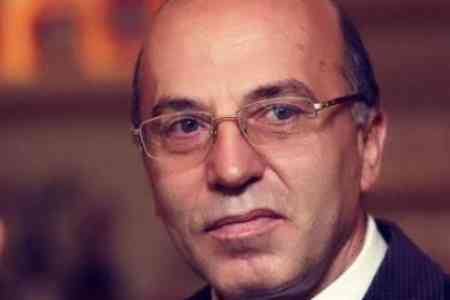


ArmInfo. Today in Armenia there are all prerequisites for the development of a preventive and economic policy that provides breakthrough, and therefore it is necessary to replenish the sphere of management of specialists. This opinion was voiced by the economist, the head of the research center "Alternative" Tatul Manaseryan during a press conference on August 14.
According to the expert, today the country has created unprecedented opportunities, excluding artificial interference and subjective policies that have been conducted in Armenia until recently. In view of this, Manaseryan urged the authorities not to delay with the adoption of serious decisions, in particular from the point of view of stimulating investments, primarily domestic ones.
In this connection, he stressed that in the region Armenia looks in a favorable light from the point of view of financial stability, taking into account the weakening of the national currency in the currency markets of Turkey, Iran, Azerbaijan and Georgia. The monetary policy pursued by the Central Bank of Armenia provides a certain stability, which, according to the economist, is a very important background for the business environment.
"I want to urge the Armenian authorities to use the opportunities provided. We are talking not only about the stability of the national currency, but also about the devaluation of the ruble in Russia, which is of double importance for us, "Manaseryan said. He explained that with the weakening of the ruble, consumption in the Russian market will decrease, which will affect the volumes of Armenian export products sold in Russia. Along with this, there are certain positive factors, he added. In particular, from the point of view of selling raw materials and other commodity groups in rubles, which creates conditions that allow us to accumulate reserves of strategic importance, and be prepared to withstand further shocks, in particular those related to sanctions against Russia and Iran. "That is, this situation is more than receptive, and we should try to conduct an effective flexible economic policy," he stressed.
Speaking about the latest data on Armenia's economic development, the expert noted that the figures published by the National Security Council are more than encouraging. However, they testify to the inertial development of the economy, he continued. "This suggests that the foundations for economic development were laid earlier and now the economy is inertially continuing to develop. But there is also a positive moment - this trend will be prolonged, "Manaseryan said.
The growth of economic activity in the first half of this year. at 8.9% per annum, he said, was provided thanks to the main drivers, in particular the mining industry with an increase of 3.7%, domestic trade - by 10%, services - by 18%, the agricultural sector - by 5.5% , foreign trade - by 28.9%. Separately, the expert singled out the construction, which for the first time in a long time demonstrated double-digit growth rates (13.5%), after a previously recorded decline. "Given the volume of construction, which is an indicator and a locomotive for the development of other economic spheres, the current year turned out to be quite favorable for Armenia," he stressed. At the same time, the expert noted the absence of changes in the GDP structure, which led to the need to review the inertial economic policy. At the same time, he drew attention to the problem of increasing Armenia's recognition in the international arena. The expert sharply negatively spoke about the agricultural sector. "I see more problems here than achievements. It's time to "pull" the agriculture out of the swamp, for which it is necessary to develop a monthly program of actions and appoint responsible persons for their execution. And since the AIC is the basis of economic development, it is necessary to link it with other sectors of the economy, "he concluded.
According to the National Statistical Service of Armenia, economic activity in Armenia in the first half of the year increased by 8.9% per annum against the backdrop of the prevalence of rising import rates over exports. Growth in economic activity in the first half of the year in 2018 determined the services sector by 18.1% and the construction sector 13.5%, against which the growth of other industries looked modest: the trade sector - 9.1%, the agricultural sector - 5, 5%, industrial sector - by 3.7% and energy complex - 1.5% per annum.